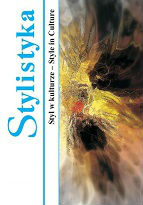STYLE PERSWAZJI W POLSKIM I NIEMIECKIM KOMENTARZU EKONOMICZNYM W PRASIE PUBLIKOWANEJ ON-LINE
Persuasion styles in Polish and German economic press commentaries published on¬line
Author(s): Iwona SzwedSubject(s): Language and Literature Studies
Published by: Uniwersytet Opolski
Keywords: online press commentary; illocutionary structures analysis; economic texts in Polish-German comparative perspective
Summary/Abstract: In the article the question of a culture-conditioned style is examined in terms of a comparative analysis of Polish and German economic press commentaries. The choice of the area to be analyzed is determined by the fact that communicative acts in humans are closely connected to the environment dominated by economic, social and political processes. In recent years, the economic situation in particular has been a factor influencing life of the societies, arousing public attention. Additionally, press commentaries on those issues are relatively easy to access for an average reader. In an era of increasing supremacy of electronic media in communication, the comments published online are becoming dominant, so the current tendencies in the language may be traced in them. That is the reason behind choosing online publication as a research corpus for this article. In the examined texts, linguistic means of persuasion have been analyzed. Those means, despite the ongoing process of globalization are still determined culturally. A tool that permits to comprehend the similarities and discrepancies is, among others, examining illocutionary structures in the texts. A method relatively popular in 1980s and 1990s, especially in German linguistics, later subject to severe criticism. The article shows the potential of the above-mentioned method in press commentaries examination, at the same time however, an analysis of argumentative structures was carried out. The latter permitted to capture the quantitative dominance of certain arguments (deontological and ethical-aesthetic), while employing the analysis of illocutionary structures allowed for determining their role in the structural hierarchy, therefore to conclude which of the arguments play the superior, and which the supportive role. Moreover, the corpus comprising the Polish and German online press publications constitutes interesting research material in terms of changes in the presentation of the text, that is to formulate questions about the boundaries of individual genres, about the freedom of the reader in choosing the „modules” on the Internet or, consequently, about the reader’s responsibility for the text created this way.
Journal: Stylistyka
- Issue Year: 2014
- Issue No: XXIII
- Page Range: 435-459
- Page Count: 24
- Language: Polish

